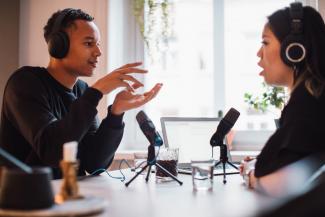
Do the preparation task first. Then listen to the audio and do the exercises.
Preparation
Transcript
Presenter: So, today's expert teacher is Gabriella, a university English teacher from Leeds. Gabriella, hi and thanks for joining us today.
Gabriella: Thanks for having me!
Presenter: So, I have to confess today's topic is something I am really bad at: listening. Most people say speaking is the most stressful part of learning a new language but, for me, with my B1 German, speaking isn't so bad. At least I'm in control of it. But listening … woah … people speak so fast and it's like my brain just shuts down. Am I just really strange and bad at listening? Tell me, honestly, I can take it.
Gabriella: No, you're not strange. In fact, it's really common. You know, in exams most people do pretty well in speaking compared with listening. Of course, exams are a different situation from real life because in an exam you can't ask for something to be repeated or explained. You usually have just one or maybe two opportunities to listen to the dialogue and then it's gone.
Presenter: Right, but in real life I feel stupid always saying, 'Sorry, can you repeat that, please?', especially if I still don't understand even when they repeat it. And people out there listening, I hope you don't do this – quite often the person just repeats what they said equally as fast and I'm still lost!
Gabriella: They do, don't they? In real life, you've got two strategies. One is to pretend to understand and get out of the conversation as fast as you can.
Presenter: Yep, sounds familiar!
Gabriella: But, obviously that's not going to help if it's a conversation with high stakes. It might have important consequences. I mean, if you're just chatting with a stranger at the bus stop, it doesn't matter. But imagine you're at a government office or a bank, trying to find out what paperwork you need to get your ID or open a bank account. What can you do then?
Presenter: I hope you've got the answer, Gabriella, because I'm coming out in a cold sweat just thinking about either of those situations!
Gabriella: The other strategy is to summarise what they said.
Presenter: But how can you do that if you didn't understand what they said?
Gabriella: Ah, well, you only start the summary, so you might say, in German in your case, 'OK, so the first thing I have to do is …?' and make it a question. Or, for example, 'And which office is that again?' Break it down into smaller questions and the other person will naturally start answering them. That way you're controlling the conversation a bit more.
Presenter: I get you ...




In my opinion, the best way in order to improve listening in English a start answer a lot of practices and exercises in website or app.
Also, the useful phrases is used live daily.
On of my strategy is practice my language through 4 skills of English including listening because I think it's match with each other. when you improve your speaking by default you will improve your listening. this is the reason that I'm joining this course for now. I also exchange listening to music by podcast in English to learn new vocabulary and keep the sounds and phrases in my mind.
Your on the right track. Practice everyday for at least an hour. The BBC offers many free podcast lessons https://www.bbc.co.uk/sounds/podcasts.
I use the British Council's LearnEnglish platform to improve my listening skills, , which I find very helpful. As I advance to higher level to B1, I found more challenging features like linking between words, so I repeat sentences one by one to practice both listening and speaking.
Indeed the British Council's LearnEnglish platform is great. Here's another link incase you're not aware of it yet: https://www.bbc.co.uk/sounds/podcasts
This website is so helpful for me to practise my English skills. Now I am trying to memorize some phrases from this listening and will try to use it in my daily working life. Thank you!
Hi StitchyPoohPika,
Great! We are glad to hear that. We hope you enjoy your English practice here and find it useful.
Jonathan
LearnEnglish team
Thank you for the lesson! It's really helpful for me.
I think if I want to improve my listening I have to learn the meaning of phrases and new words. That's why I always finish the preparation at first.
In my opinion, the best way to improve listening is to listen more and and write down the new words and try to use these words in the daily life.
Excellent Exercise